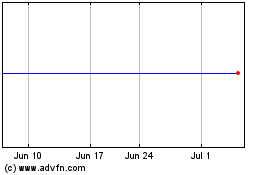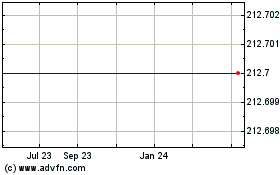Aetna, Humana Defend Merger as Justice Department Warns It Would Harm Consumers
December 30 2016 - 7:37PM
Dow Jones News
By Brent Kendall
WASHINGTON -- Health insurers Aetna Inc. and Humana Inc. told a
federal judge Friday that their proposed $34 billion merger
wouldn't harm consumers, while the Justice Department pressed its
position that the combination will suppress competition.
The Justice Department alleges the merger would unlawfully
reduce competitors in the market for private Medicare Advantage
plans, a government-backed alternative to traditional Medicare for
seniors. It also says the deal threatens harm to consumers in three
states who purchase insurance plans on Affordable Care Act
marketplaces.
"Protecting competition in these markets is critically
important," Justice Department lawyer Craig Conrath said during
closing arguments in the case, which has been in trial since Dec.
5.
After the government filed its lawsuit, Aetna in August pulled
out of insurance marketplaces in 11 states, including the areas
covered by the Justice Department's legal complaint. The department
says the move doesn't matter, but the insurers said the withdrawal
should nullify that part of the government's case.
Aetna lawyer John Majoras said the company left the ACA
exchanges for financial reasons, not litigation. "The losses that
Aetna suffered were significant," he said.
Mr. Majoras also stressed the insurers' argument that the
Justice Department claims of competitive harm in the Medicare
Advantage market ignored the fact that most seniors choose
traditional Medicare instead, which is always an alternative to the
private Medicare option.
U.S. District Judge John Bates, after being relatively reserved
in asking questions during earlier stages of the proceedings,
peppered both sides with questions Friday. He spent considerable
time asking whether he should consider traditional Medicare as a
competitive alternative to the private Medicare plans offered by
the insurers, underscoring the importance of the issue. If both
options are considered part of the same market, it could prove
fatal to the Justice Department's arguments that a merged
Aetna-Humana will be dominant.
The judge said seniors "make a choice" on whether to go the
public or private route for coverage. "Overwhelmingly they choose
original Medicare," he said. But the judge also noted that the
companies in their internal business documents never seem to view
the government as a competitor in the Medicare market.
In one potential bright spot for the companies, Judge Bates said
the market for private Medicare plans is heavily regulated by the
government and wondered whether that could limit the ability of a
merged Aetna-Humana to engage in anticompetitive behavior.
In possibly problematic comments for the insurers, the judge on
multiple occasions questioned the sufficiency of their plan to fix
any antitrust problems with the merger by selling off Medicare
assets to Molina Healthcare Inc. Under that arrangement, Molina
would take over assets representing about 290,000 Medicare
Advantage enrollees in 21 states, acting as the competition once
provided by Aetna and Humana when they battled each other for
business.
Judge Bates said Molina's own documents showed its leadership
had concerns about whether it could operate the assets
successfully. He also said health-care providers were under no
obligation to contract with Molina in the same way they did with
Aetna and Humana.
The judge, under tight time pressure to rule in the case next
month, held the crucial closing argument session Friday afternoon
while much of official Washington was quiet ahead of the New Year's
holiday. He said he would issue a decision "in a timely
manner."
The Justice Department simultaneously has been challenging the
Aetna-Humana transaction and another major proposed industry
merger, Anthem Inc.'s proposed acquisition of Cigna Corp. If both
deals were allowed to proceed, the transactions would leave the
nation with three giant health insurers: the two merged firms and
UnitedHealth Group Inc.
The department sued in July to block both mergers, saying they
would lead to higher prices and reduced benefits. The lawsuits were
among the last major actions by Obama administration antitrust
enforcers, who in recent years grew increasingly assertive in
seeking to stop mergers they believed would harm consumers.
The Anthem case, taking place in the same courthouse, also is
expected to be decided in January.
Write to Brent Kendall at brent.kendall@wsj.com
(END) Dow Jones Newswires
December 30, 2016 19:22 ET (00:22 GMT)
Copyright (c) 2016 Dow Jones & Company, Inc.
Aetna (NYSE:AET)
Historical Stock Chart
From Mar 2024 to Apr 2024

Aetna (NYSE:AET)
Historical Stock Chart
From Apr 2023 to Apr 2024
